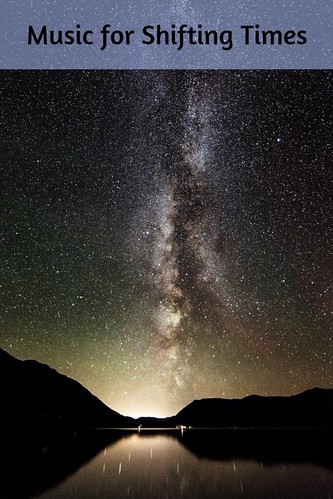Shifting times. That’s certainly true. In all areas of life, it may seem challenging to find ways to take time to reflect, to take a step back, even to take a moment or two for quiet conversation.
It is said that really listening to a piece of music, concentrating on it for the several minutes, can help with that.

At times, that means reflecting on the words; other times, it is music without words that’s most helpful; in still other circumstances, considering ways words and music join together is what works best.
Any of these aspects of music can draw you in, and keep you connected. Any of them may help refresh you in these shifting times.
The title of Carrie Newcomer’s song Take More Time Cover Less Ground suggests being open to a different way of going through an hour, or a day, than might be usual.
In her lyrics, Newcomer makes clear she is not so much suggesting pausing as stopping. She’s thinking about taking time and focus to really notice what’s around you, and what thoughts and discoveries might come from that.
Carrie Newcomer is based in Indiana. You will find Take More Time Cover Less Ground on her album called A Great Wild Mercy.
Christine Albert and Chris Gage are based in Austin, Texas. They are both excellent songwriters themselves, and they also have a good ear for choosing songs from others to cover.
Chris grew up in South Dakota, where he got to know songwriter Tom Peterson. Eventually Chris and Christine, who record as Albert and Gage, decided to do a whole album of Peterson’s songs. This one, Dakota Lullaby, is the title track of that project. Both in lyrics and in the video Chris and Christine made for it, there is imagination and creativity in the taking time to look for detail, and for memories, too.
Memory plays a part in a song Irish-American musician Cathie Ryan chose to record, too. She herself is an excellent songwriter who knows well how to choose good songs from others, also. This one, May the Road Rise to Meet You, is by Roger and Camilla McGuinn. In it, they spin a story inspired by a familiar Irish blessing. Ryan’s understated take on it gives time and attention to the idea of reflecting on detail and memory, too. You will find it recorded on Cathie Ryan’s album Through Wind and Rain. Ryan is based in Ireland’s east.
Rhiannon Giddens drew on a legend which made its way from Africa over to the US South in slavery times. It is called We Could Fly.
Among other things, it has to do with being inspired by the courage of others, of taking action from hope and dreams. It is on Rhiannon’s album Freedom Highway; she and the album's producer Dirk Powell worked on the song together. Rhiannon, who is originally from North Carolina, is based in Ireland.
Fiddle player and composer Hanneke Cassel is based in Boston, where she draws on Scottish and Cape Breton music in her work. She spent a time several years back in China, both to teach and to learn. One of the pieces of music to come out of this was Dot the Dragon’s Eyes.
Hanneke says that she learned that adding that last touch to the eyes in a painting was thought to bring the art to life.
That was an idea she held in mind when writing the piece, which became the title track to the album on which it appears.
If you are familiar with Celtic rock or the music of Scotland, you might know the song Hearts of Olden Glory. It was one of the signature songs of the long running band Runrig, and was written by band member Rory Macdonald.
This is a much quieter version. Gaelic singer Julie Fowlis and her husband and musical partner Eamon Doorley have performed it on big stages with Runrig as the band was winding down. Here though, it’s just the two of them together in an setting that allows focus on the many layers of landscape, memory, and hope to be found in the sparse lyrics. Julie and Eamon are based in the Highlands of Scotland.
Take more time, cover less ground, as Carrie Newcomer advises. Take some time to focus on these songs. Allow the creativity of these artists to refresh you through these shifting times.
Thank you for staying with us through this journey. Below, you'll find a link that will take you to an article which has a bit more backstory on the series. It also has links to a number of the stories, including ones called Listening for Community, Music for Winter's Changes, and The Geography of Hope.
Kerry Dexter is Music Editor at Wandering Educators.
You may find more of Kerry's work in National Geographic Traveler, Strings, Perceptive Travel, Journey to Scotland, Irish Fireside, and other places, as well as at her own site, Music Road. You can also read her work at Along the Music Road on Substack.

